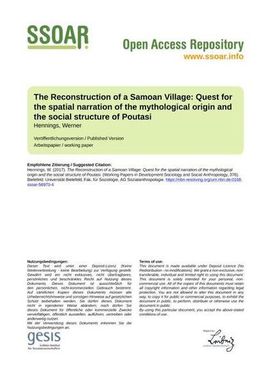Connect with GESIS - Leibniz Institute for the Social Sciences. Library Cologne
Contact this content partner to get more information about this item.
The Reconstruction of a Samoan Village: Quest for the spatial narration of the mythological origin and the social structure of Poutasi
- Description:
- In 2009 the traditional village centre of Poutasi was destroyed by a tsunami and a majority of the inhabitants since then have abandoned the old settlement. Only a few of the former residents repaired or reconstructed their houses at the traditional site at and around the village square; most of them decided to adopt a settlement development which increasingly took into account a persistent trend: to meet the requirements of modern mobility and to live at or near the road. As a result of this shift the village has lost its traditional public space - the village square - but at the same time it has not found a similar place at the road. Although most central institutions of the village and the district today are located at the main road within a small distance from each other, there is no public square where people can meet, communicate and celebrate their festivities as they were used to doing at the traditional square. The loss of the traditional village centre is not only a loss of sociability, but also a loss of the social identity of the village: The traditional village square and its surrounding buildings once reflected the mythological origin and the social structure of the village as described by the Samoan mythology and documented in the faalupega, the archives of the Samoan society. The loss of the traditional village centre of Poutasi means the loss of an important part of the Samoan spatial archives including sociality.
- Location:
- Samoa
- Format:
- text
- Collections:
- GESIS - Leibniz Institute for the Social Sciences. Library Cologne
- Content partner:
- GESIS - Leibniz Institute for the Social Sciences. Library Cologne
- Availability:
- Not specified
-
Copyright status: All rights reservedFind out more about what you are able to do with this itemThis item is all rights reserved, with means you'll have to get permission from GESIS - Leibniz Institute for the Social Sciences. Library Cologne before using it. For more information, please see our use and reuse page.More informationGESIS - Leibniz Institute for the Social Sciences. Library Cologne has this to say about the rights status of this item:
http://rightsstatements.org/vocab/InC/1.0/
What can I do with this item?Non-infringing useNZ copyright law does not prevent every use of a copyright work, and this item may be hosted by an international institute or organisation. You should consider what you can and cannot do with a copyright work.No sharingYou may not copy and/or share this item with others without further permission. This includes posting it on your blog, using it in a presentation, or any other public use.No modifyingYou are not allowed to adapt or remix this item into any other works.No commercial useYou may not use this item commercially.
Related items
Welcome and warm Pasifik greetings
The information on this site has been gathered from our content partners.
The names, terms, and labels that we present on the site may contain images or voices of deceased persons and may also reflect the bias, norms, and perspective of the period of time in which they were created. We accept that these may not be appropriate today.
If you have any concerns or questions about an item, please contact us.
